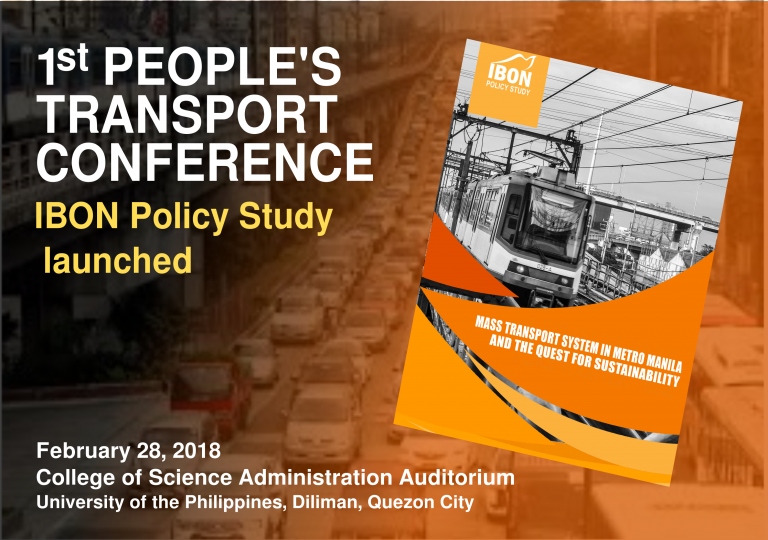
Policy study baring unsound transport policies released
Research group IBON said that the Philippine government’s policies have increasingly opened the transport sector to profit-oriented control, thereby privatizing the transport system and undermining public usage of this very basic service. Government should reverse this trend and strengthen the public transport system to improve people’s mobility and thus contribute to national development, said IBON.
“The intolerable traffic in Metro Manila, the daily MRT breakdowns, the lack of public transit systems in other parts of the country, the pollution, and the state of disrepair of vehicles available for public use are just the tip of the iceberg of the problems besetting the country’s transport system,” said Rosario Bella Guzman, IBON executive editor and research head.
According to a study released by IBON during a transport conference in the University of the Philippines, government’s economic policies have resulted in a privatized, individualized and private car-intensive transport system in the country including in its urban centers. Private cars reportedly account for 72% of vehicular traffic but only 33% of passenger travel, the group noted. Only 6% of commuters ride mass transport, which is much less than the estimated 20-40% benchmark for developed urban areas. Rail transport meanwhile is privatized, and is not only expensive for the average commuter but concentrated only in Luzon.
Public access to transportation is bound to narrow with the Duterte government’s Build! Build! Build! Program, said IBON, which is opening the transportation sector to big business control. “This is profitable for countries such as China, South Korea and Japan, and international financial institutions such as the Asian Infrastructure Investment Bank (AIIB), and the World Bank, which have committed to finance big-ticket projects,” said Guzman. “Big businesses like the Ayalas, San Miguel Corporation, Pangilinan, and their foreign partners, have also expressed interest both in bidding projects and offering unsolicited proposals.”
But by experience, business-run public services and utilities in the country such as power, water and telcos charge the majority low-income riding public additional user fees for profit, Guzman said. The public utility vehicle (PUV) modernization program is headed the same way, she added.
Government should be able to ensure an efficient, reliable, affordable and environmentally sound mass transport system, Guzman said. It should have an active role in the provision of this service and make sure that mass transport systems – which should be planned well with the rest of the economy – serve the Filipino people’s mobility as the country’s nation builders.
IBON’s policy study titled “Mass Transport Systems in Metro Manila and the Quest for Sustainability” exposes the country’s dismal and decrepit transport system as a symptom of a backward and underdeveloped economy. It proposes for a sustainable public mass transportation system broken down into steps that can be undertaken by any government genuinely looks after the interests of the nation and its people, said Guzman.
The policy study was launched during what was dubbed as the 1st People’s Transport Conference, which IBOn co-organized with Bagong Alyansang Makabayan (BAYAN), Advocates of Science and Technology for the People (AGHAM) and the Samahan at Ugnayan ng mga Konsyumer para sa Ikauunlad ng Bayan (SUKI). ###